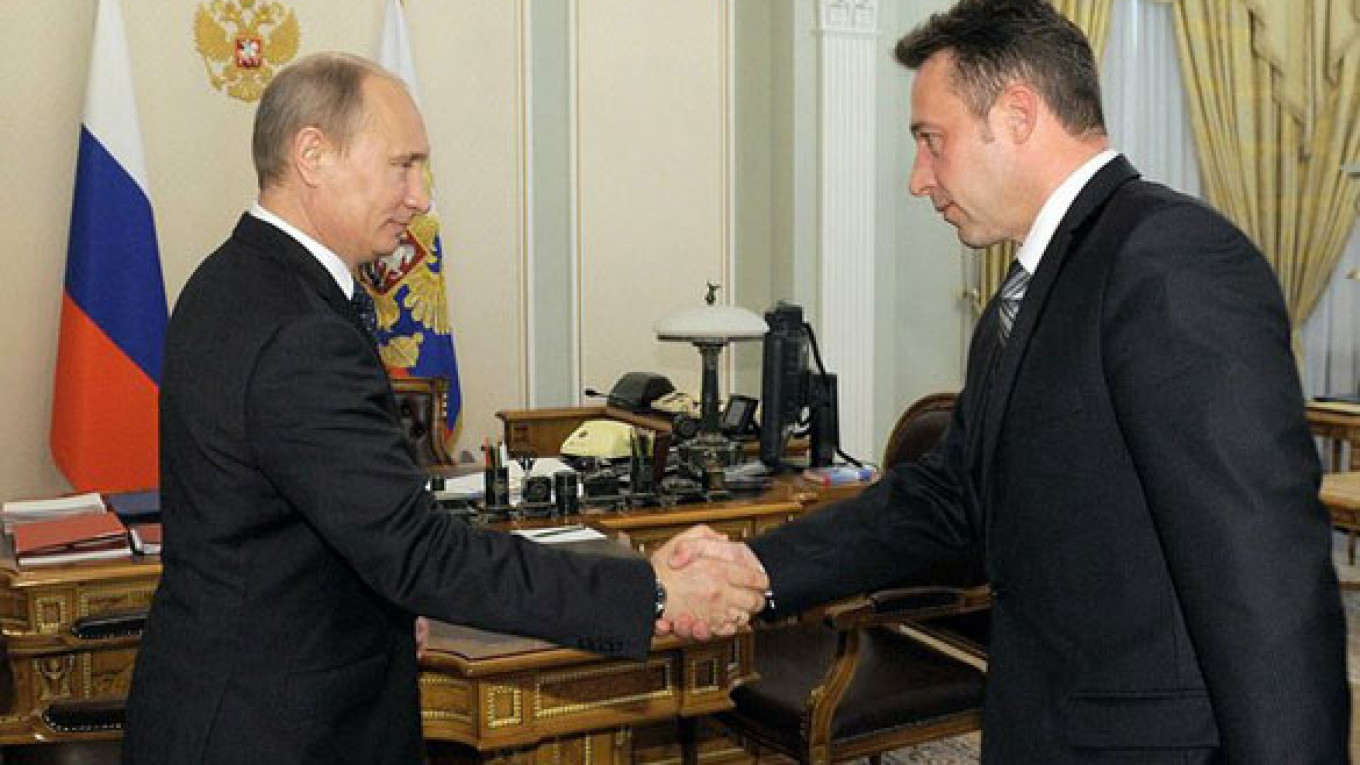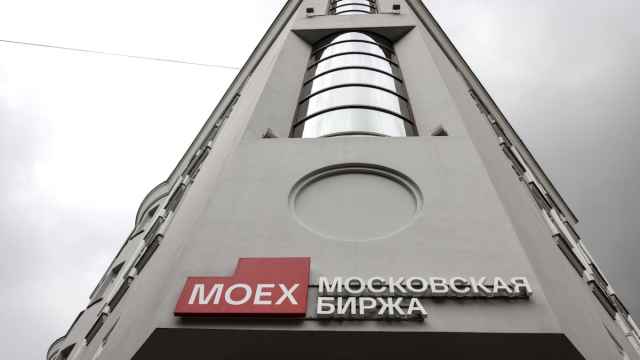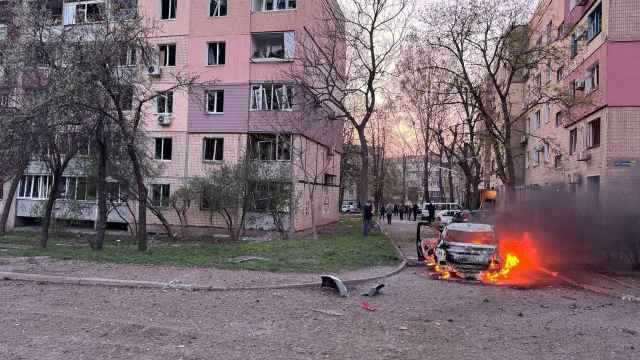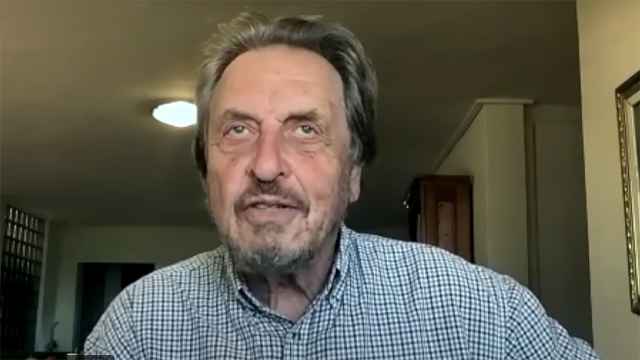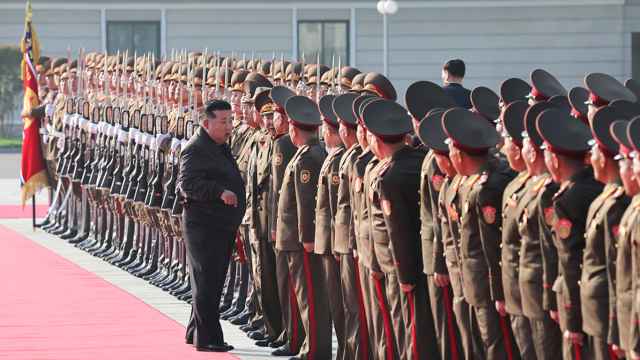Sending a clear signal that loyalty will outrank experience in making government appointments, President Vladimir Putin has nominated a tank factory employee who once promised to target opposition protesters in Moscow as his new envoy to the Urals Federal District.
Putin’s move shows he is determined to make political decisions single-handedly regardless of appointees’ qualifications and, if continued, could radicalize the moderate opposition, analysts said.
Igor Kholmanskikh, 42, head of a tank-producing section at the Uralvagonzavod plant, was offered the position by Putin personally.
“You would be able to defend people's interests,” Putin told Kholmanskikh in offering him the job during a meeting at his Novo-Ogaryovo residence outside Moscow on Friday.
He noted that the post of presidential envoy would allow Kholmanskikh to have control over the activities of local law enforcement officials.
“I will try not to let you down,” Kholmanskikh replied, according to RIA-Novosti.
Kholmanskikh was unknown outside his factory until he appeared on Putin's annual televised call-in show in December and suggested that he bring his fellow workers to Moscow to deal with opposition protests spurred by the disputed State Duma elections.
Kholmanskikh’s enthusiasm won a broad smile from Putin, and, shortly afterward, he joined Putin's presidential election team, flying around the country in a business jet, according to Forbes magazine.
The post of presidential envoy in the Urals Federal District, whose lifeblood is the heavy-machinery industry, became vacant last week after Putin nominated Yevgeny Kuivashev to become the next governor of the Sverdlovsk region.
If made envoy, Kholmanskikh would become the first person with no prior government or political experience to hold such an office.
The envoy’s office lacks the clout that it had when Putin formed the eight federal districts to bring wayward governors under Kremlin control in 2000. But the Kremlin continues to rely on the envoys, many of whom are current or former political heavyweights, to serve as powerbrokers with the regional elite. The ranks of the envoys have included a former prosecutor general and a former Kremlin chief of staff, while acting Deputy Prime Minister Alexander Khloponin now serves as envoy to the North Caucasus Federal District.
Kholmanskikh's nomination was roundly criticized by opposition-minded politicians, with Nikolai Levichev, leader of A Just Russia’s Duma faction, even joking that a former governor should be hired to replace Kholmanskikh at the tank factory.
Mikhail Vinogradov, an analyst at the Petersburg Politics Foundation, a think tank, said Putin was using the nomination to show that he alone was in charge in the government.
“The unpredictability of nominations has become a goal in of itself,” he Kommersant, adding that such ploys would draw more protesters to the streets and radicalize the moderate opposition.
Moreover, Putin has indicated that he values people who “are not shy in showing their support,” said Olga Mefodyeva, an analyst with the Center for Political Technologies.
“The president has shown the envoys the value of their institution, while Putin has shown the people that he has won [the election] and now will do whatever he pleases,” Leonid Volkov, a Yekaterinburg city lawmaker, told Kommersant.
The ruling United Russia party, however, applauded the nomination and predicted that more ordinary Russians would get key government posts. “Those who make fun of Kholmanskikh have already shown what kind of people they are, and the public doesn’t trust them,” Sergei Neverov, a senior United Russia official, said in a statement.
Kholmanskikh is the second Uralvagonzavod employee in line for a senior post for supporting Putin. His co-worker Valery Yakushev became a United Russia Duma deputy from Putin's All-Russia People’s Front in December.
In March 2011, Yelena Lapshina, 39, a weaver from the Ivanovo region who shot to fame in 2007 for demanding that the Constitution be amended to allow Putin to serve a third term as president, was handed a United Russia seat in the Duma. She, however, served only several months before the December elections and was not elected into the new Duma.
But Andrei Lugavoi, who is wanted by Britain on charges of killing Kremlin critic Alexander Litvinenko in 2006, began a second term in the Duma as a member of the Kremlin-friendly Liberal Democratic Party.
Meanwhile, Kholmanskikh had to fend off a storm of sarcasm about his nomination, some nonprintable because of vulgarities, on a Twitter account that he Saturday.
One comment said Kholmanskikh would “certainly travel to work in a tank.”
“I will if I have time,” Kholmanskikh tweeted back.
Another user corrected one of several misspellings in Kholmanskikh's posts.
Still another wrote that all “real” presidential envoys have Putin's business card with a color photograph, “which they kiss good night.” Kholmanskikh replied that he didn't have a business card but “on the plus side” had a portrait of Putin.
Kholmanskikh graduated from Urals State Technical University in 1994, trained to work as an engineer with wheeled and track vehicles. He immediately went to work at Uralvagonzavod, following in the footsteps of his parents, to a biography released by RIA-Novosti.
Prior to his studies, he received a license to teach tank-driving lessons during a two-year stint in the military.
Kholmanskikh is married and has three children.
A Message from The Moscow Times:
Dear readers,
We are facing unprecedented challenges. Russia's Prosecutor General's Office has designated The Moscow Times as an "undesirable" organization, criminalizing our work and putting our staff at risk of prosecution. This follows our earlier unjust labeling as a "foreign agent."
These actions are direct attempts to silence independent journalism in Russia. The authorities claim our work "discredits the decisions of the Russian leadership." We see things differently: we strive to provide accurate, unbiased reporting on Russia.
We, the journalists of The Moscow Times, refuse to be silenced. But to continue our work, we need your help.
Your support, no matter how small, makes a world of difference. If you can, please support us monthly starting from just $2. It's quick to set up, and every contribution makes a significant impact.
By supporting The Moscow Times, you're defending open, independent journalism in the face of repression. Thank you for standing with us.
Remind me later.


